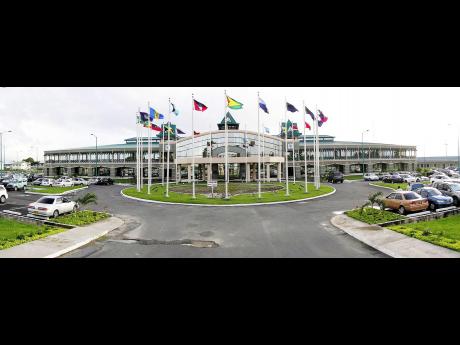CARICOM takes stock - CSME review highlights just concluded 37th Heads of Government meeting
It appears the Caribbean Community (CARICOM) had no choice but to order the first review of the 15-year-old Single Market and Economy (CSME).
The review order was the biggest announcement to come from the just-concluded meeting of the 15-member regional bloc in Georgetown, Guyana.
Roosevelt Skerrit, Dominica's prime minister and new CARICOM chairman, declared that the 37th Heads of Government Conference was "the most successful" minutes after the final business discussions were held last Wednesday to close the Guyana meeting.
Skerrit then quickly sailed through several decisions agreed on, of which, perhaps, the most profound was the decision to review the CSME set up in 2001 to facilitate the movement of goods and services across the 12 member states who are participants.
"We addressed a number of matters to keep the regional process moving," he told journalists before announcing the decision to review the CSME.
Although, he tried to suggest that the review is not aimed at weakening the movement, documents classified as confidential suggest that CARICOM was forced to act as regional states were not implementing a range of measures they agreed to over many years.
Even a lack of good working relationships among the various arms of CARICOM has been fingered.
OVERRIDING CONCERN
The report, which was seen by The Sunday Gleaner, states that "an overriding concern is the difficulty and inability in getting the decision-making organs of the Community to meet".
It pointed out that over the last year, "three or more unsuccessful attempts were made to convene both Council for Trade and Economic Development and the Council for Finance and Planning.
"Why this is so," the report said, "has to be carefully considered since the situation sets the tone for what is deemed to be important or relevant."
Then, there is the issue described by one CARICOM report as "a major challenge" which involves meeting the expectations of stakeholders.
Jamaica's Prime Minister Andrew Holness told journalists at the conference that work has to be done to ensure that "tangibles" of the movement are seen so as to "make economic sense" to the people of the region.
Holness has established a commission to review Jamaica's place in CARICOM although he insists that there is not push for Jamaica to leave the regional body.
Some leaders have spoken even more forthrightly on the work of the regional body, most notably, St Lucia's prime minister Allen Chastanet, who admitted to The Sunday Gleaner that all member states should review their place.
"I think everybody should (review). One of the things I've always preached is zero-based budgeting. Zero-based budgeting is every year that you don't build, you budget from where you were last year; you go back to zero and you justify everything that you're doing," said Chastanet.
A document entitled, 'Establishment of the CARICOM Single Market Economy Summary Status of Key Elements and Outstanding Action' revealed that the majority of the member states are delinquents as they have, for years, failed to implement a number of agreements they either signed to or ratified.
In one instance, the status report noted that except for Guyana, the remaining CARICOM member states, including Jamaica, are "still to make amendments to the relevant section of the immigration laws providing for six months definite entry for CARICOM national service providers".
Jamaica is one of the countries identified as needing to clarify its law to ensure "the right (of CARICOM nationals) to work during the initial six months".
Irwin LaRocque, the CARICOM secretary-general, told The Sunday Gleaner of areas, such as education and disaster response, where the regional body is effective but also accepted that there are challenges. LaRocque, however, expressed confidence that these can be overcome.
In the meantime, observers in Guyana, last week, stated that the relatively short time between the order for the review which was made in July and next February, when the report is due, indicates that CARICOM may be anxious.
18 ITEMS FOR DISCUSSION
Approximately 18 items were on the agenda for discussion at this year's Heads of Government Conference. In addition to the CSME and free movement issues which dominated talks, leaders were also consumed by the potential fallout from the British vote to leave the European Union (EU).
BREXIT IMPLICATIONS
STILL UNCLEAR
CARICOM heads essentially left the meeting still uncertain about the implications of Brexit, especially as it relates to trade with the EU and the billions that come to the Caribbean yearly in development finance.
Much of the uncertainty lies in the timing of the UK's withdrawal, the negotiations that will follow and the importance each will have to the Caribbean.
"The Caribbean Community will continue to have excellent relations with the United Kingdom on its own, and continue to have excellent relations with the EU less the UK.
"Of course, there will be implications for us. We have to study those implications, but one has to wait for the final negotiations," Skerrit told journalists.
CARICOM trade with the UK separately, and the EU has been declining over the years. In the case of the EU, CARICOM exports moved from US$4.7 billion in 2008 to US$2.8 billion in 2014.
Meanwhile, the Jamaican prime minister has indicated that CARICOM is considering options, including 'disengaging' with the Dominican Republic over a court decision from that country rendering thousands of people with Haitian descent stateless.
Holness spoke of the 'disengaging' option just before the conference ended, but suggested that he may not be in favour of that measure.
According to Holness, "The real principle at play here is to build a community of understanding, and I believe that there has to be greater engagement with the Dominican Republic."
CARICOM has insisted that the actions of the Dominican Republic are "an egregious violation of human rights and a flagrant breach of the Dominican Republic's international obligations".




